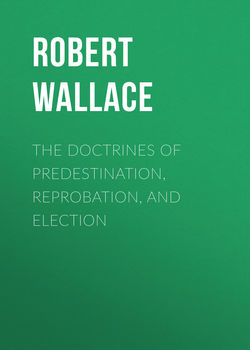Читать книгу The Doctrines of Predestination, Reprobation, and Election - Robert Wallace - Страница 5
PART I.—PREDESTINATION
CHAPTER II.
CALVINISTIC PREDESTINATION IN REFERENCE TO DIVINE WISDOM
ОглавлениеThe wisdom of God is held as proving universal foreordination. Being infinitely wise—such is the argument—He will act upon a plan, as in creation, and as wise people do in regard to affairs in general. And this is perfectly correct. The question, however, is not whether God has a plan, but what that plan comprehends? Sin being a factor in the programme of life, the Divine wisdom or plan will be exercised in reference to it. There are two ways in which this may be done. It may be foreordained as part of the plan, as is seen in the above extracts. But another way is this: The Divine wisdom may be exercised in regard to sin, not as ordaining it, but as overruling it, and in turning it to account. That the evil deeds of men bring into view features of the Divine character which would not otherwise have been seen, is no doubt true, but this does not save the wrong-doers from the severest blame. But what is wisdom? It is the choosing of the best means to effect a good end. The ultimate end of creation is the glory of God, as He is the highest and the best of beings. There can be nothing higher than himself He desires the confidence and the love of men.
“Love is the root of creation, God’s essence.
Worlds without number
Lie in His bosom like children; He made them for this purpose only,—
Only to love and be loved again.”—Tegner.
Men are asked to give Him their trust and love. It is right that they should do so, for He is infinitely worthy of them. But what are sinful actions? Essentially they are foolish, and issue in misery. And if God foreordained them, how can we esteem Him as wise and good? And if not to our intelligence wise and good, how can we give Him our confidence and love? Trust and love are based upon the perception of the true and the good. If I find a man who is destitute of these qualities of character, to love him with approval is, as I am constituted, an impossibility. But to ordain the “acts of the wicked,” as Hodge says that God did, in order to spread Christianity, was neither just nor good. It was doing evil that good might come. Instead of being wise it was, if it were so, an exhibition of unwisdom as regards the very end of creation, as it was fitted to drive men away from, instead of bringing them to, God. And yet wisdom, Divine wisdom, was exercised in reference to those very persecutions. It was true, as Tertullian said, that the “blood of the martyrs was the seed of the Church.” By means of the sufferings of the early Christians men’s minds were directed to that religion which supported its adherents in the midst of their accumulated sorrows. Their patience, their heroic bravery in facing grim death, threw a halo of moral glory around the martyrs which touched the hearts of true men who lived in the midst of general degeneration. The Christians were driven from their homes, but they carried the truth with them.
“The seeds of truth are bearded, and adhere we know not when, we know not where.” In the world of nature there are seeds with hooks, and others have wings to be wafted by the breeze to their proper habitat. And if Divine wisdom watches over the seeds of the vegetable kingdom, does it not stand to reason that it will do so in regard to truth? God overrules the evil, and makes it the occasion of good. Joseph was immured in jail, but from it he ascended to a seat next the throne. Christ was crucified, but from the blessed cross came streams of blessing. Paul was incarcerated, but from his prison came “thoughts that breathe and words that burn,” that have kept alive the flame of piety for more than a thousand years. The people of God still suffer, but, like the asbestos cloth when thrown into the fire, they, by these sufferings, become purified and made meet for the coming glory. In thus overruling evil, God, we say, shows the highest wisdom and love fitted to secure our trust and affection; but to ordain evil would be an illustration of supreme folly, fitted to lower him in the estimation of angels and of men.
